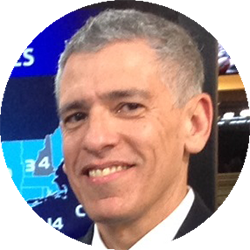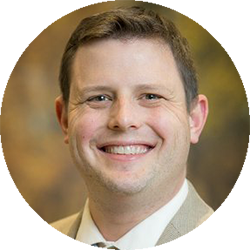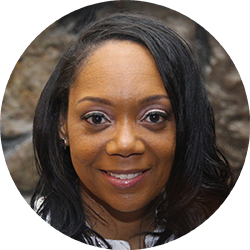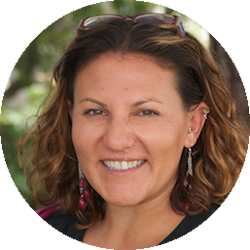by Jeff Dodge
Political polarization in an election year is nothing new, but in 2020, when you add to the mix deep divisions over the handling of a pandemic, addressing systemic racism and stopping racially motivated violence, it seems as if we’ve forgotten how to talk to each other about what is ailing society and how to fix it.
Or listen.
For Ernesto Sagás, a professor of ethnic studies at Colorado State University, the words of his 8-year-old son’s social studies teacher may hold a lesson for the grown-ups: “Listen respectfully.”
Sagás, whose research focus includes politics and race/ethnicity/identity, is one of many faculty in the College of Liberal Arts examining what is at the root of what often feels like irreconcilable differences facing the country right now. It’s what some call a “wicked problem” because there is no clear solution. And it’s tied up in complex issues around privilege, free speech, civic engagement and democratic institutions such as the free press and our two-party political system.
Then and Now

Sagás, in addition to offering what his son is learning, says looking back at history — and how we get our information today — can provide some perspective on how polarized we really are as a nation.
Sagás suggests that social media and the news media accentuate our differences and give us the perception that we are more polarized than we really are. He points to voting results from the two previous elections showing that both Republicans and Democrats lean more to the center than the Twittersphere and incendiary headlines suggest.
“We get the impression that we only have two extreme points of view, and the media reflects and amplifies that,” Sagás says. “If you’re trending, people tend to listen to you. But we’re still pretty much a centrist society.”
He points to studies such as the 2019 “America in One Room” project at Stanford University. More than 500 liberals and conservatives were gathered to talk about pressing election issues, and after extended discussions, they found common ground and compromises by humanizing each other, Sagás says.
“If you’re not willing to compromise, if it’s ‘my way or the highway,’ you’re not going to be successful,” he says. “If you’re so immersed in your little bubble that if you give even an inch it seems like an existential threat, it’s not. Rarely do you find a bill that makes it to the president’s desk that hasn’t gone through compromise.”
These aren’t problems that can be solved with any new technology or engineering marvel; it’s about human nature, and that’s where the liberal arts can provide insight.
“In the liberal arts, critical thinking is so important,” Sagás says. “We separate the noise and perceptions from reality. Educated people can determine what is real and factual.”
Loss of Local News

Matthew Hitt, an associate professor in the Department of Political Science, has also examined the role of the media in our perceived divisions. He co-authored an article for The Conversation in February 2019 about his research team’s finding that the closure of many local newspapers around the country has fueled political partisanship. The idea is that as readers lose their local media sources, they turn to national outlets, which tend to be more divisive and polarizing because of their focus on partisan conflict. Hitt and his co-authors write that national news outlets tend to frame political battles as a game with winners and losers, accentuating the differences between the two major parties and emphasizing their conflicts.
Hitt argues that in a time when journalists and their work are often measured by metrics such as clicks, page views, comments, shares and time on page, the natural tendency is to provide coverage that elicits an emotional reaction. It can lead to what Hitt calls “affective polarization.”
“If you get people more fired up and angry, they’re more likely to engage,” Hitt said. “It takes us out of a rational, logical, cognitive process. It just becomes us against them: ‘That’s the other team, we don’t like them.’ It’s harder to get to the point where you can say, ‘My neighbor is not a member of my political party, but he’s still a nice person.’”
Hitt and his co-authors are now finishing a book about the topic. It will focus on an experiment that The Desert Sun newspaper in Palm Springs, California, conducted in summer 2019. During the month of July, the paper ran only opinion pieces focused on local issues — no commentaries on national topics. It was a volatile time politically; former special counsel Robert Mueller testified to Congress in late July about his investigation into Russian interference in the 2016 election that resulted in Donald Trump becoming president.
Hitt and his co-authors decided to conduct surveys before and after the experiment, comparing results among the paper’s Riverside County readers to residents in Ventura County, which served as a control group.
Based on the researchers’ preliminary survey results, after being exposed to a month of exclusively local opinion pieces in the Desert Sun, residents in Riverside County showed less growth in affective polarization, or negative feelings about the opposing party, than those in the Ventura County control group, who were exposed to the usual op-eds on national politics.
“If you think of the free press as a political institution,” Hitt said, “you could argue that we are in a difficult feedback loop right now.”
Social Media

Tori Omega Arthur, an assistant professor in the Department of Journalism and Media Communication who has worked in television news, agreed that staffing cuts and closures among local newspapers is driving traffic to the social media accounts of larger national outlets that favor sensational stories.
“That phenomenon is definitely a problem across the nation, with local news sources drying up and increasingly only having access to national news,” she said. “And national news outlets are trying to get ratings, trying to get clicks, trying to get likes, trying to increase their follower count. If it bleeds, it leads.”
Like Sagás, when it comes to social media, Arthur warns that things aren’t always as they seem. She cites recent cases of people pretending to be someone they’re not on social media, movements that have been co-opted, and the rise of “performative activism,” in which people who don’t have a vested interest in a particular issue perform online as if they do, to get attention.
“Often it’s about getting the likes and ego boost of posting things online,” Arthur says, adding that social media algorithms direct content to users based on what they’ve engaged with before, reinforcing existing mindsets instead of exposing people to a variety of viewpoints.
“Social media can definitely be a positive space that brings people together around pressing issues,” she explains. “It can be a space for radical activism and positive change. But I think as we move deeper into election season, as media consumers and engaged citizens, we have to be very mindful of our own media literacy, how we engage with the social media posts that are being presented to us, and asking questions.”
Arthur has her students ask four questions before jumping on board a trend, challenge or fad on social media: What is the source? Who started the movement and is it legitimate? Why should I get involved? What is the overall purpose of this social media moment, and how am I advancing the purpose of it?
Challenging Students

Jessica Jackson, an assistant professor in the Department of History, also does a lot of work in the realm of how we treat each other when it comes to democratic institutions and civic engagement. Her research concentration is immigration history, and she oversees history majors who are on the teaching track to become K-12 social studies instructors.
Jackson regularly works with her students on the wicked problem of partisanship. In one class, she had a student who wanted to become a U.S. Border Patrol agent, and another whose parents immigrated from Latin America. How does she get them to set aside that “us versus them” mindset? Critical thinking and humanitarianism.
“What I tell my students is we should lean into politics, but we need to create space where marginalized populations feel safe,” Jackson explains. “That doesn’t necessarily mean being neutral. My students and future teachers need to decide how they’re going to navigate not wanting to alienate students that hold certain opinions while being an ally/collaborator and creating safe/brave spaces for their students with marginalized identities. An opinion based in fact is not a bias. If you present evidence for your opinion, it’s critical thinking.”
At the beginning of her courses, she involves her students in creating shared community guidelines for everything from using smartphones in class to having discussions based on facts, not emotions. It creates a safe space, or what she calls a “brave space,” for students to ask questions and express their views.
“It’s OK to disagree,” Jackson said. “They don’t need to agree with me. They may have a different answer to a wicked problem, but they need to be able to ask questions and dialogue across differences in a way that uses evidence. If we spend too much time in our echo chambers, not agreeing with people, that doesn’t move us forward.”
Wicked problems, by definition, have no easy or purely technical solution, according to College of Liberal Arts Dean Ben Withers.
“These kinds of issues often involve competing values and tough choices,” he says. “We will address wicked problems only by moving away from an ‘us-versus-them’ mentality and learning to listen to multiple perspectives as we move forward toward communal decisions. Listening respectfully, thinking critically and using empathy are crucial to a functioning democracy and some of the most important skills that a liberal arts education provides.”
This story is part of a series of articles from the College of Liberal Arts exploring the Gordian Knot of wicked problems within the realms of globalization and global perspective; environment and sustainability; race, diversity, and inclusion; and democratic institutions and civic engagement.
Read the first story in the series at libarts.source.colostate.edu/addressing-societys-wicked-problems-requires-the-liberal-arts.